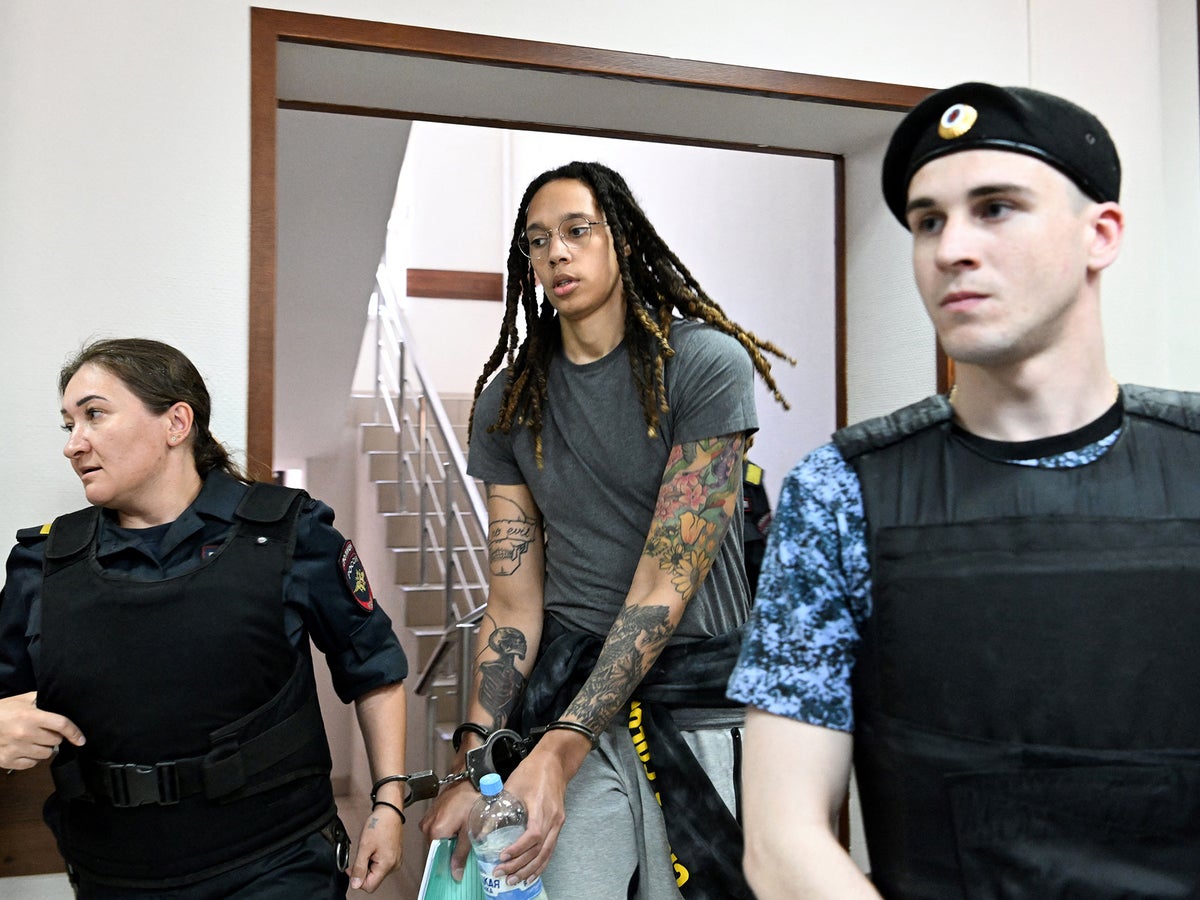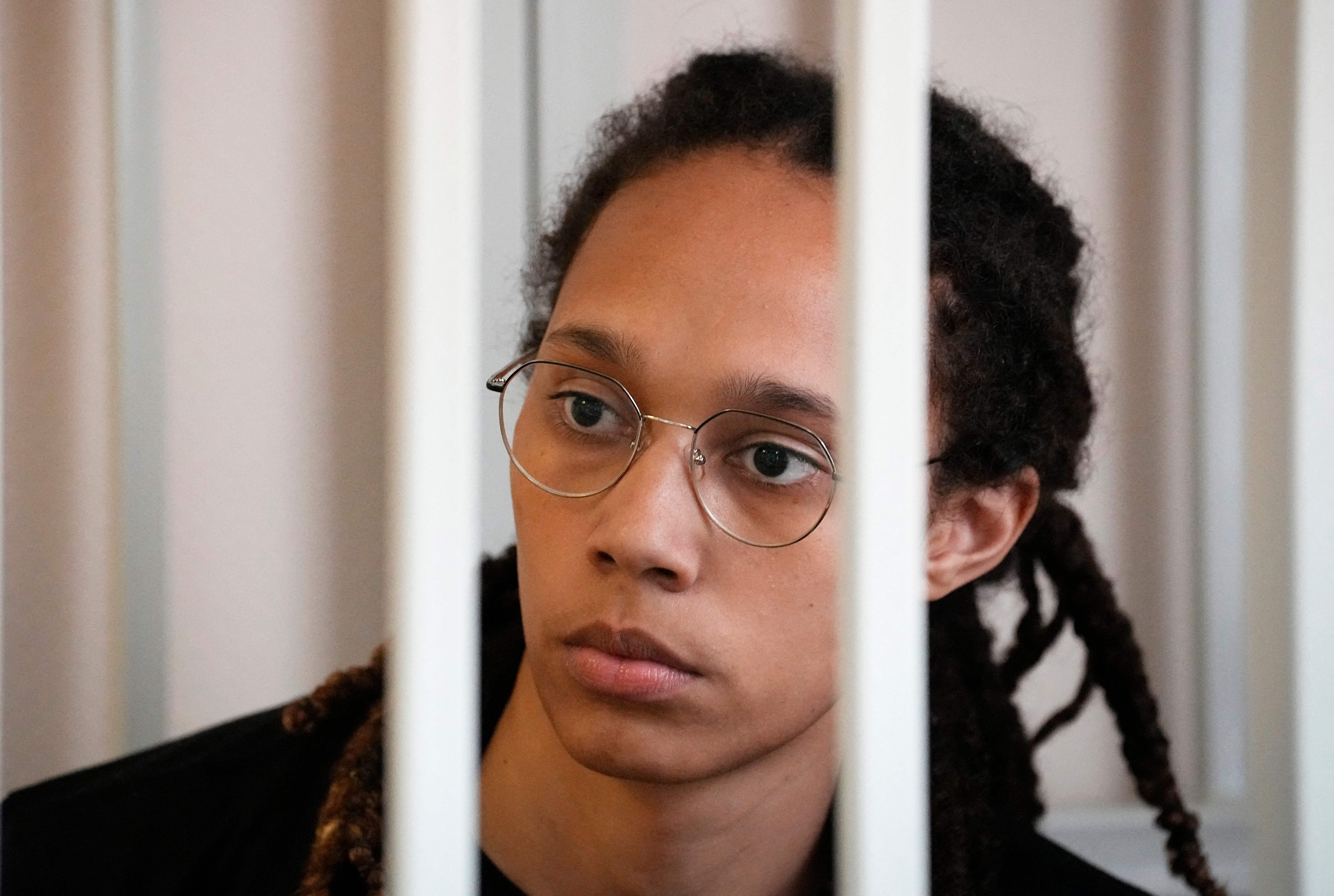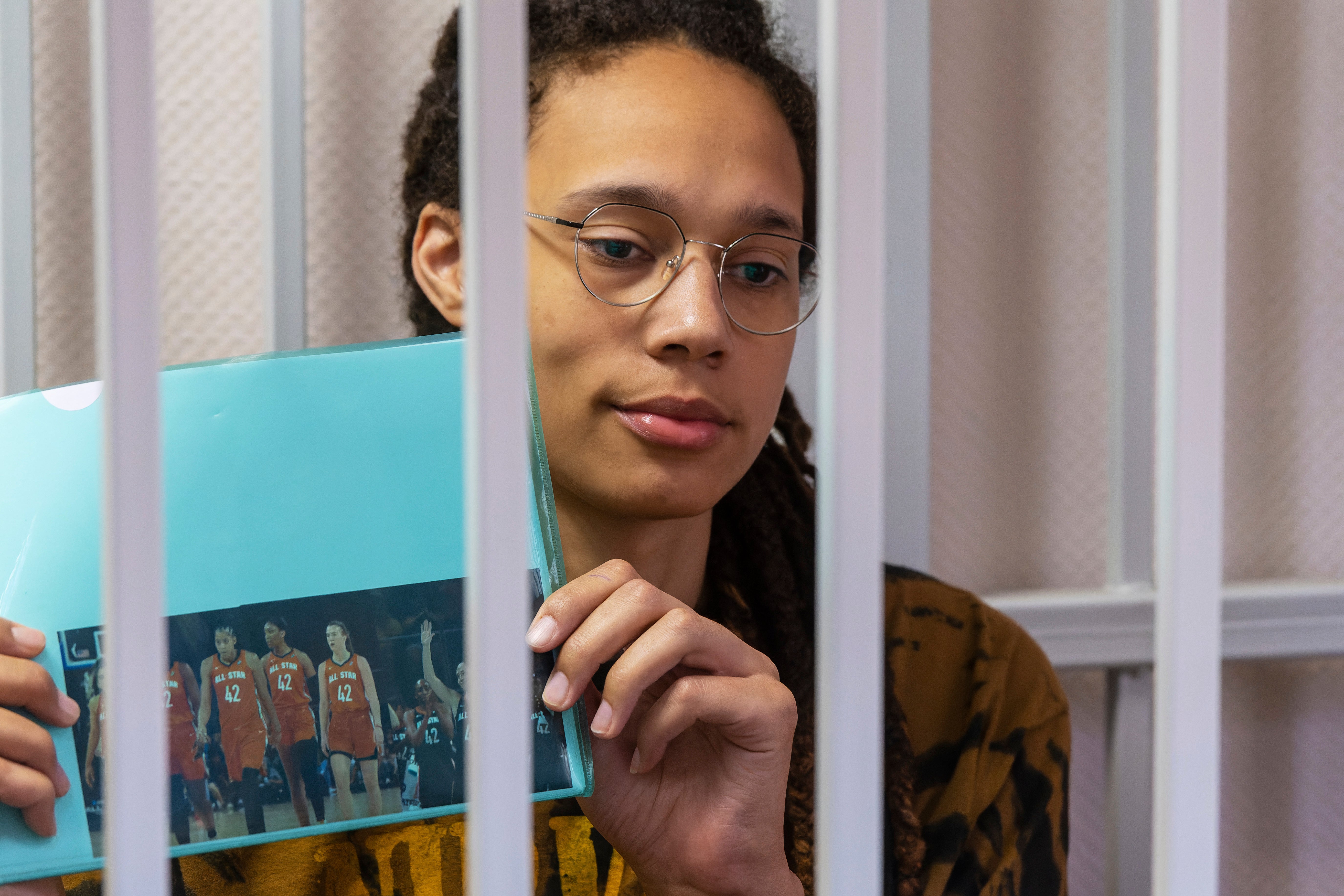
WNBA star Brittney Griner, 31, has been detained in Russia since February after illegal cannibas oil was allegedly found in her luggage by officials at a Moscow airport. Now, she’s going to prison.
Her detainment occurred shortly before Russia launched its war in Ukraine, with geopolitical tensions making it undoubtedly more difficult to secure her release.
Ms Griner’s family, friends and fans – alongside many public figures – have been calling on Russia to free her for months and for the US State Department to intervene.
Her trial began on 1 July, days after a court ordered her detainment be extended until December.
She returned to court on Thursday 7 July and pleaded guilty to drug charges that could see her face 10 years in prison.
Here's everything we know about the ordeal.
Who is Brittney Griner?
Ms Griner plays for the Phoenix Mercury WNBA team as a centre.
She also formerly competed with the US Olympic basketball team in 2016 winning gold at the Rio Games and picking up her second winner’s medal in Tokyo last summer.
She is an accomplished basketball player, earning a Best Female Athlete award at the ESPYs and an endorsement deal with Nike in 2013.
What happened?
On 17 February, Ms Griner was traveling through the Sheremetyevo International Airport in Moscow when Russian customs officials allegedly found cartridges containing the offending hashish oil in her luggage.
Ms Griner was taken into custody at the airport on charges of large-scale transportation of illegal narcotics, which carries a sentence of up to 10 years in prison.
On 27 June, Russian courts extended Ms Griner's detention until 20 December.
Her trial began on 1 July with a closed-door hearing, after which she declined to speak with reporters.
The Russian government presented evidence that the WNBA star “bought two cartridges for personal use, which contained 0.252 grams and 0.45 grams of hash oil,” according to a courtroom report from state news agency Tass.
The trial resumed on 7 July, with Ms Griner clutching a photo of her wife Cherelle as she told a judge she would plead guilty, according to reporters in the courtroom.
“I’d like to plead guilty, your honour. But there was no intent. I didn’t want to break the law,” Ms Griner said, speaking English which was then translated into Russian for the court.
“I’d like to give my testimony later. I need time to prepare.”
Ms Griner was eventually sentenced to nine years in prison.
“Today, American citizen Brittney Griner received a prison sentence that is one more reminder of what the world already knew: Russia is wrongfully detaining Brittney,” Joe Biden said in a statement shortly after the verdict was read. “It’s unacceptable, and I call on Russia to release her immediately so she can be with her wife, loved ones, friends, and teammates. My administration will continue to work tirelessly and pursue every possible avenue to bring Brittney and Paul Whelan home safely as soon as possible.”
Why was she in Russia?
Ms Griner had been in Russia to play basketball in the Russian Premier League.
Many American athletes travel overseas during the US off-season to continue competing in their chosen sport.
The off-season foreign leagues provide American athletes with additional money-making opportunities and a chance to keep their skills sharp through continuous competition.
WNBA stars like Ms Griner typically make, on average, a mere 1.5 per cent of the salary that their male counterparts in the NBA make in a year, so playing outside of the US often helps make up for that pay disparity.
Ms Griner reportedly earns $1m per season she plays in Russia while her base salary at the Phoenix Mercury is said to be $221,450.
What is being done to help her?
Supporters of Ms Griner, alongside her family and friends, have been calling for her release for months.
Democratic congressman John Garamendi told CNN that securing her release will be “very difficult” due to the ongoing political tensions between Russia and the US over the Ukraine war.
There are some US officials who have theorised that Russia is using Ms Griner's detainment as a political bargaining chip.
Pentagon official Evelyn Farkas has said she fears Ms Griner will be used by Russia as a “high-profile hostage” with which to secure prisoner exchanges with the US.
On 23 March, a diplomatic official was granted access to visit Ms Griner in Russia, and said that she was in ”good condition”.
Russian monitors also checked in on Ms Griner and reported that she was fine with the exception that the bed in the facility where she is being held was not built for someone of her height.
More than 40 organisations, which includes the NAACP, the Human Rights Campaign, GLAAD, the National Urban League and the Women's National Basketball Players Association, sent US president Joe Biden and vice president Kamala Harris a signed letter calling on them to make a deal with Russia to secure her release.

A prisoner swap was reportedly first considered on 15 May, with Ms Griner potentially being returned to the US in exchange for arms dealer Viktor Bout. Mr Bout was convicted in 2011 of conspiracy to kill American citizens and officials, of delivering anti-aircraft missiles, and of providing aid to a terrorist organisation. He is currently being held in a US penitentiary.
US secretary of state Antony Blinken said he has spoken with Cherelle Griner and that his top priority was ensuring the release of Americans imprisoned in Russia.
“I’ve got no higher priority than making sure that Americans who are being illegally detained in one way or another around the world come home,” he said.
“That includes Paul Whelan, that includes Brittney Griner, that includes people in a number of other countries.”
Cherelle Griner spoke with Reverend Al Sharpton about her wife’s detention in Russia and described the WNBA star as “struggling.”
“She’s there terrified, she’s there alone,” she said.
Ms Griner shared her fears directly with Mr Biden in a letter as her trial got underway.
In excerpts shared by her representatives, she writes: “As I sit here in a Russian prison, alone with my thoughts and without the protection of my wife, family, friends, Olympic jersey, or any accomplishments, I’m terrified I might be here forever.”
Cherelle Griner issued fresh criticism of the Biden administration’s handling of the case on 5 July, calling it “very disheartening” that she hadn’t heard back from the White House about her imprisoned wife.
“I will not be quiet anymore,” Cherelle Griner told CBS. “I will find that balance of harm versus help and pushing our government to do everything that’s possible because being quiet means they are not moving, they are not doing anything.”

The White House responded by insisting that Ms Griner’s case is a “priority” – before Mr Biden and Ms Harris spoke with the basketball star directly.
“The president called Cherelle to reassure her that he is working to secure Brittney’s release as soon as possible, as well as the release of Paul Whelan and other US nationals who are wrongfully detained or held hostage in Russia and around the world,” the White House said in a statement.
“He also read her a draft of the letter the president is sending to Brittney Griner today.”
The statement added that other officials like Mr Blinken and national security advisor Jake Sullivan have been in previous contact with Cherelle Griner about the situation.
On 27 July, Mr Biden formally offered to exchange Bout for Ms Griner and Mr Whelan, as he been mooted earlier, according to US government officials.
”We certainly hope that that Russia will favourably engage on it, but I don't want to get into more detail about that,” John Kirby, the National Security Council’s coordinator for strategic communications, told reporters at the daily White House press briefing.
”We believe that this is a serious proposal, and we want the Russians to take it seriously as well.”
In mid August, former NBA start Dennis Rodman announced he planned on traveling to Russia to try to secure Ms Griner’s freedom.
“I got permission to go to Russia to help that girl,” Mr Rodman told NBC News. “I’m trying to go this week.”
Mr Rodman has previously engaged in unorthodox diplomacy. He has visited North Korea several times over the past decade and befriended Kim Jong Un, and once called Russian President Vladimir Putin “cool” after a 2018 visit to Moscow. It’s unclear how he intends to secure Ms Griner’s release.







